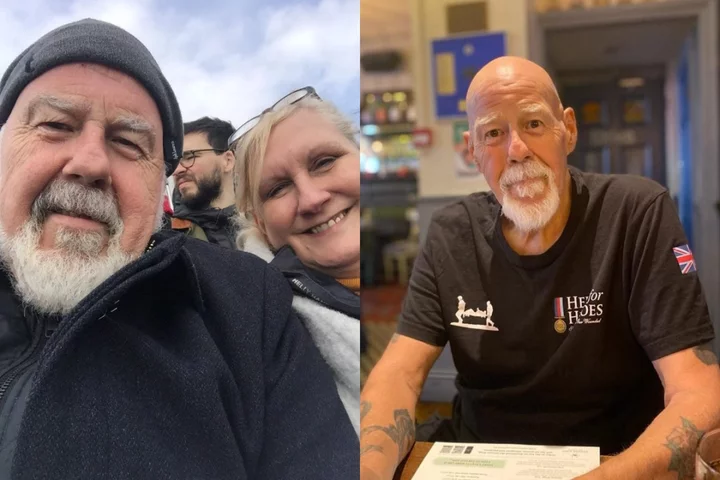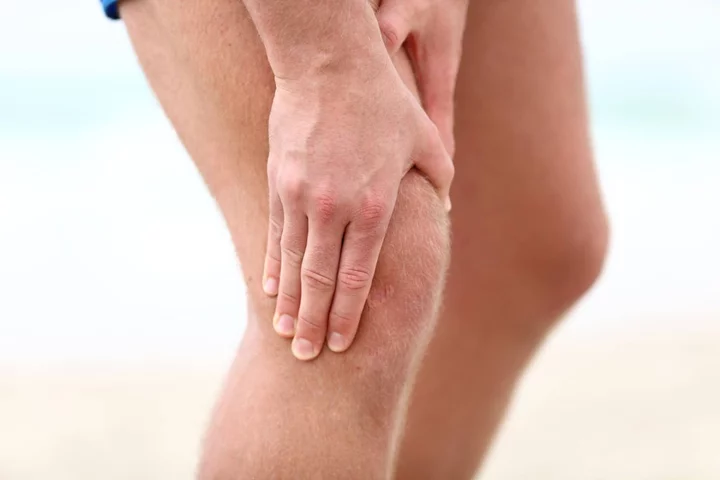
Cancer-hit dad who planned his own funeral defies doctors’ three-week life expectancy prognosis
A father-of-three who was told he looked like “Casper the ghost” before being diagnosed with acute myeloid leukaemia (AML) and given three weeks to live, meaning he has planned his own Requiem Mass and funeral, has defied doctors’ expectations by outliving his prognosis by more than a year and said he is going to “keep fighting”. Dennis Blackman, 62, a former chartered building surveyor and carer who lives in Eltham, London, said he has always been active – playing rugby, lifting weights, and going to the gym at least three times a week. However this all changed when he suffered an unexpected stroke in 2015. His health deteriorated over the following years, he had a hip replacement at 58, and after experiencing symptoms of extreme exhaustion, cold hands, and muscle weakness in early 2022, his wife Sally, 62, a former flooring showroom manager, suggested he book a doctor’s appointment. After weeks of blood tests and blood transfusions in hospital and being told he looked like “Casper the ghost” because he was so pale, he underwent a bone marrow biopsy, and this led to the devastating news in March 2022 that he has AML – a type of blood cancer – and three weeks to live. Dennis told PA Real Life: “I just broke down and I had this unbelievable feeling of guilt because I said to the consultant: ‘What have I done wrong? How do I tell my children and wife?’ “It’s a huge burden to put on someone, to tell them that you’re dying and it’s going to be very quick. “We had many dark days, and every time I looked into my children’s eyes I just burst into tears… it was a very emotional period for all of us.” Dennis, who has lost 50kg (7st 9lbs) since his diagnosis, did not start chemotherapy until months later due to him being too weak, and in January 2023, he was told the chemotherapy was “not working any more”. From that point on, he said he wanted to “enjoy each day” rather than pursuing more aggressive forms of treatment – and since then, he has planned his own Requiem Mass with hymns such as How Great Thou Art and Ave Maria (As I Kneel Before You), as well as the arrangements for his funeral. Now, Dennis continues to drive, go shopping, and enjoy time with his family, and he said he is going to “keep fighting” during the time he has left as “you only have one life”. “Every day you go to bed and you think: ‘Am I going to wake up tomorrow?’ And then each morning you think: ‘Is it going to be today that I’m going to die?’” Dennis explained. “It was extremely difficult in the beginning and I tried to shut the world out… but as time went on, I realised you can’t live like this forever. “You only get one life, so I’m going to do everything I can to keep fighting.” During his 40s and early 50s, Dennis said he enjoyed going out for meals with his wife Sally, playing rugby with his sons James, 37, and Joe, 31, and keeping fit by going to the gym several times a week. He foresaw spending his days in retirement with his family, out in the garden, or fishing, but he said this all changed when he had a stroke in 2015, aged 54, and his health declined from then on. In early 2022, he spent six weeks at Queen Elizabeth Hospital in London after noticing some unusual symptoms and was told: “You look like Casper (the ghost), you’re very anaemic.” He then underwent several blood tests and blood transfusions, and although he had “an idea” that he may have cancer, he said he could never have prepared himself for his diagnosis on March 31 2022. “About one o’clock, I had a knock at the door and I thought: ‘That’s ominous’,” Dennis said. “The consultant and the specialist nurse came in and they said: ‘Unfortunately it’s bad news, you’ve got severe AML and there’s not a lot we can do at this stage.’ “’You’ve got three weeks to live, and I’d advise you to go home and tell your wife and family, and make sure everything’s in order because you haven’t got long left’.” Given Dennis has severe neutropenia as well – a low number of white blood cells – he is at a higher risk of contracting serious infections, and this meant he missed several family celebrations in the months that followed, including his grandson’s birthday party and stepdaughter’s wedding. He developed multiple chest infections and fevers and was not deemed fit enough to start chemotherapy straight away, and he ended up spending three months in hospital from July to October. “We thought we were going to lose him, he was so ill,” Sally, who has been married to Dennis for 10 years, explained. “Even the consultant thought we were going to lose him. “I was scared because I just thought: ‘How can this be happening when we’ve only just met each other?’ We just thought we were going to have the rest of our lives together.” However, Dennis, who is Catholic, said he “fought and prayed every day”, adding: “I said to the consultant: ‘If you promise to me you won’t give up on me medically, I promise I’ll fight this all the way.’” Dennis was determined to get better and, with the help of a physiotherapist, he built up his strength – and at one point, he was walking 10,000 steps a day along the hospital corridor. Towards the end of October 2022, Dennis said “everything seemed hunky dory” and he commenced the first of four rounds of chemotherapy, where he experienced nausea, exhaustion, and “tremendous leg bone pain”. By January, he was told the chemotherapy was “not working”, but rather than trying other forms of treatment, he said he wanted to “enjoy the little things” and the time he has left. He has planned his own Requiem Mass and funeral to relieve any pressure from his family, but also to give him “strength” and some control over his destiny – and aside from his regular check-ups and blood tests each week, he is setting himself small milestones, such as attending a Madness concert at the O2 in December. Although he is “struggling to survive”, he said he would do “anything to get another day” – and that is why he is holding onto hope and wants to encourage others never to give up. “Even though I pray every day, not once have I asked God to take it away from me – all I ask is that He’s with me when I need him, to give me the strength to carry on fighting,” he said. “Leukaemia is painful and every day I question whether I’ll see another day, but we just try and keep going and I hope that my story gives hope to others. “I’ve still got lots of memories to make yet, so I’m going to fight this all the way.” For more information and support, visit Leukaemia Care’s website at leukaemiacare.org.uk Read More Charity boss speaks out over ‘traumatic’ encounter with royal aide Ukraine war’s heaviest fight rages in east - follow live One in 10 ‘spending beyond their means’ – try these 7 cutbacks guaranteed to save families money What is combination cholesterol therapy, as study suggests it could save lives? Cancer cases in young people ‘are rising’ – the warning signs to look out for
1970-01-01 08:00

One in 10 ‘spending beyond their means’ – try these 7 cutbacks guaranteed to save families money
Times are hard, and it’s no surprise to learn many people are spending more than they earn. New research has found one in 10 people spend more than they have in their current account at least seven months each year, and more than half (59%) spend more than they earn at least one month a year. The research, for website TopCashback, also revealed that while parents with children under 18 typically have just £179 left in the bank the day before payday, nearly three-quarters (73%) of people feel they don’t have their spending fully under control, with nearly half (47%) citing the rising cost of living as the cause. And around two-fifths (41%) admit they feel anxious about the cost of living on a weekly basis. “So many people are guilty of spending above their means – let’s face it, it’s why credit cards are such big business,” says finance expert Vicky Parry, head of content at MoneyMagpie. She says emotional spending can be a real issue, pointing out: “When we feel deprived of something, it makes us seek out that dopamine to feel good, so we online shop, and we buy things we don’t even need.” And Rajan Lakhani, a money expert at the smart money app Plum, says: “With wage growth now beginning to exceed rising costs, households may be tempted to spend even more.” But he stresses it’s important to try to get any high interest debts down before succumbing to spending temptations, and notes there are plenty of easy ways for families to reduce their spending. Here, Parry and Lakhani outline their tips for family cutbacks as the cost-of-living crisis continues to bite… 1. Avoid brands Parry advises families to stop buying branded goods in the supermarket, pointing out that the mark-up can be huge. “More often than not, it’s made in the same factory as the supermarket’s own-brand product,” she says. “If you equate a brand as a stamp of good quality, then try to change this mindset – look at the taste awards and you’ll see many own-brand and cheaper products are superior.” 2. Get the kids involved with cutting energy bills If they’re old enough to understand, talk to your kids about why it’s important to switch off lights when they leave a room, and why the heating might not be on as much when winter comes. Lakhani says: “As a dad, I’m having to constantly tell my eldest daughter to switch off the lights when she’s left the room. That helps in the short-term, but explaining to children why it’s important to do this, whether it’s the benefits for household bills or the environment, means they’re more likely to remember.” He says smart meters also provide a fun way to bring cost-saving to life for kids, as they can see the impact of switching off lights or turning off appliances that aren’t being used. “It becomes a game for them, and you can create competitions around who’s being the most energy-efficient,” he suggests, pointing out that children’s help could make an important difference, as although energy bills have fallen, prices are still far higher than they were at the start of last year. 3. Budget Keeping your eyes firmly on a budget is the first step towards stopping overspending, stresses Parry, who points out there are some good budgeting apps that tell you what your monthly budgets should be. “Have lists of items you want, items you need and items that will make your life easier,” she suggests. “If you see a top in the sale, yet ‘top’ isn’t on those lists, you’re being impulsive. It’s a good way to remember what you genuinely need.” Lakhani says it’s crucial to budget in the supermarket, and families need to “develop your special superpower” against clever in-store marketing ploys. “Have a set budget and shopping list, and ringfence how much you want to spend on groceries,” he advises. He suggests buying groceries online can help with set budgets, because you can see how the costs are totting up as you put them in your virtual trolley. “Buying groceries online also reduces the chances of being tempted by impulse purchases and kids asking for extra things, while also being easier to find offers,” he says. 4. Childcare share After-school clubs may be a necessity for some parents, but the cost can be crippling – Parry points out that the average fee for an after-school club is usually between £8-£15.50 per session, so five days a week for the 39 weeks of the school year can cost as much as £2,925 per child per year. But you can cut that cost completely, she says, by getting a group of trusted parent friends together and taking it in turns to have all the children over after school for one night each a week. 5. Walk more Although it’s often tempting to use the car for short trips like the school run, Lakhani stresses: “Walking the kids to school is not only good for your pocket, but for the planet and your health. It also gives you more face-to-face time with your children, so you have more time to know how they’re feeling and what’s going on at school. “With petrol costs on the rise again as oil prices are increasing, this is a relatively simple way to cut your costs.” 6. Beware of hobby stacking Hobby stacking is when kids develop a passion for a particular pastime, and then forget it and move on to another within a few weeks. “Before you go out and buy all the kit and gear for something which is essentially a phase, try and borrow it from a friend, or make do, until you’re sure this passion is a long-term investment,” Parry advises. 7. Cut nappy costs If you’ve got a baby, nappies can cost a small fortune, but Lakhani says you can save money by buying them in bulk or having a subscription, which are often discounted. “If you’re buying in bulk,” he says, “ensure you don’t purchase too many, as you could be left with nappies that are the wrong size as your baby grows.” In addition, compare the price of nappies at different retailers, or for an even cheaper option, use reusable nappies. Not only are they cheaper (in the long run), but they’re better for the planet too. Read More Charity boss speaks out over ‘traumatic’ encounter with royal aide Ukraine war’s heaviest fight rages in east - follow live What is combination cholesterol therapy, as study suggests it could save lives? Cancer cases in young people ‘are rising’ – the warning signs to look out for How construction expert Daniel Ashville Louisy went from social media star to TV host
1970-01-01 08:00

Tom Brady shuts down retirement comeback rumors... again
Tom Brady retired for the second time earlier this year and it looks like it's going to stick. You can blame the southern heat.
1970-01-01 08:00

Warriors NBA Training Camp report, other preseason dates to know
As the new NBA season dawns, here are all the important training camp and preseason dates for the Golden State Warriors.
1970-01-01 08:00

Seal praises his and Heidi Klum’s daughter Leni for making him ‘a better person’ in rare post
Seal has spoken about his close relationship with his and his ex-wife Heidi Klum’s 19-year-old daughter, Leni Olum Klum. The musician, 60, took to Instagram on 4 September to share a snap of him and his daughter in New York City together. In the caption, he described how Leni has ultimately shaped his life, and pointed out how grateful he was for her. “In NY with the young woman who changed my life for the better 19yrs ago. Thank you Leni for making me a better person,” he wrote, before signing the tribute with: “Love you, - papa.” In the comments, Leni expressed her love for her father’s post, writing: “So cute! I love you papa,” along with a red heart emoji. Many fans of the singer went to the comments to praise his sweet relationship with Leni. “So much love in this photo! Have a wonderful time together!” one wrote, while another added: “Daddy and Daughter. Beautiful!!” The young model was born in May 2004, right after Klum split from Leni’s biological father, Italian businessman Flavio Briatore. In December 2009, Seal legally adopted Leni when she was five years old, while the singer and supermodel were still married. The former couple went on to have three more children: sons Henry, 17, and Johan, 16; and daughter Lou, 13. Klum filed for divorce in April 2012. This isn’t the first time that Seal has shown his support for the 19-year-old. During an interview with E! News in March, he spoke out about Leni’s career, as she has followed in her mother’s footsteps by becoming a model. While he noted that he’s “so proud of everything that Leni has done”, he’s “more proud of everything that she is”. “She walks through life with this type of humility that allows her to move so gracefully through it all and she has an innate understanding of people in general and people’s feelings,” the singer explained. “So I’m kind of more impressed with everything that she is.” Seal - whose real name is Seal Henry Olusegun Olumide Adeola Samuel - also spoke candidly about co-parenting with his ex-wife, adding: “I’d like to think, as a parent, that we have - between her mother and myself - that we’ve instilled some of that in her. But she can do no wrong in my eyes and she’s quite wonderful.” Earlier this year, Klum applauded her daughter for working on her mode;ling career while studying in college. “I’m very proud of my daughter and her modelling. And she’s studying at the same time, she’s juggling already,” the America’s Got Talent judge said during an interview with People in March. Meanwhile, Leni has also spoken out about working in the modelling industry as the child of two famous parents. During an interview with People in October 2022, she acknowledged that she “got a lift into” the modelling world due to her upbringing. “It’s just a fact. My parents are famous,” she said. However, when she was asked about the infamous “nepotism baby” label given to children of celebrities, Leni said it’s her own work ethic that has helped build her career thus far. “I did get help starting off, and I know that people would dream to start off with what I had,” the college student explained. “I’m so grateful that I’ve been able to take what was gifted to me by my mom. But I am doing the work and putting in the time. Now I’m working on my own, travelling alone, going to school. My mom and I just have the same love for the same thing.” Although she said that her own ambition has led her to success in her career, she still credited her parents for instilling a strong work ethic in her at a young age. “They have both taught me to be myself, and to do what makes me feel comfortable,” she said. “You can tell if you’re not comfortable and then the best of you isn’t brought out. I just think you should be open and honest with what makes you comfortable, be yourself, do what you love.” Read More Heidi Klum opens up about her and husband Tom Kaulitz’s 16-year age gap Heidi Klum’s model daughter Leni shows off grisly burn after admitting she ‘didn’t use enough sunscreen’ Heidi Klum gushes with pride over daughter Leni for ‘juggling’ modelling and college Heidi Klum denies she counts calories after report she eats 900 calories a day Sleeping pill could reduce levels of Alzheimer’s proteins Marathon runners on why autumn is the best time to start running
1970-01-01 08:00

Man Utd name 25-player Champions League squad
Man Utd boss Erik ten Hag picks his 25-player squad for the Champions League group stage.
1970-01-01 08:00

Marathon runners on why autumn is the best time to start running
Whether you have fallen out of love with running, or have always been curious about giving it a go, finding the right time to start can feel like the biggest obstacle to getting going. With the heat of summer behind us, and winter not fully on our doorstep yet, autumn could be ideal. Here, seasoned marathon runners share why right now is the best time to get into jogging… The weather is ideal Instinctively, you may feel it’s not the best time to start training as the weather begins to get colder and wetter, and the days get shorter. “However, the cooler temperatures can offer a range of benefits,” says Tahir Shams, founder of Tooting Run Club, who ran the 2023 TCS London Marathon. These include a “reduced risk of overheating and dehydration, and it supports increased endurance which is vital for longer runs”, Shams adds. Autumn training brings opportunities for different kit and environments, too. Marathoner and Human Disco Ball fundraiser Freya Morgan enjoys the change of weather. “I get to leave behind the sticky summer weather and busy parks and go back to fresh morning runs right as the sun rises,” explains Morgan, who recently completed a 200km run for Bail for Immigration Detainees. “In the autumn, I might still head out in a T-shirt and then as the weather gets colder, a long-sleeved layer, and then will take another long-sleeved top or jacket with me, and tie it around my waist or cram it into my hydration pack,” she adds. Kit could be cheaper Exercise kit is at its most expensive generally in January, when everyone and their mum is trying to tackle a new fitness goal! Getting in there a bit earlier and snapping up some end-of-season summer gear that’s on sale, before the new season’s clothing and shoes come in, may help you build a running wardrobe you love. If you look good, you feel good, after all. The race calendar If singing up for a race will help keep you motivated to keep running, starting in autumn could put you in a good position to take on a challenge in spring. Plenty of races happen as the seasons change from the cool of winter, with the London, Tokyo and Paris marathons all taking place in spring. Half marathons take place in cities across the UK in spring too, in locations from London to Inverness. Plus you’ll find plenty of 5k and 10k options. Creating a mood-boosting routine “In September, kids go back to school and the summer is over, so it is a kickstart for your health and fitness goals,” explains Ania Gabb, an ASICS Frontrunner who has completed more than 30 marathons. “Many people may want to get into a consistent fitness routine after the excess of summer and before the winter starts,” she notes. This can be especially important ahead of the dark days of winter, which as Shams notes, “can often feel like a gloomy time of the year… Endorphins released during running is a good way to banish the winter blues.” There’s less pressure than January Finally, it can particularly helpful for beginners to start in autumn – skipping the pressure of the new year. “If you are a beginner, autumn is a really nice time of year to pick up running. You are away from the pressure of January resolutions, and the crowds of the summer, and still have some fair weather days and sunlight to get you motivated,” says Morgan. “By the time the darker bits of winter roll around, you will hopefully be in enough of a running routine to use those runs to power through the dark and soggy days. I have been running for 11 years and when my mental health dips, running has always helped.”
1970-01-01 08:00

Adam Thomas ‘struggling’ and in ‘pain’ with rheumatoid arthritis ahead of Strictly Come Dancing debut
Adam Thomas has admitted that he’s “struggling” and in “pain” after being diagnosed with rheumatoid arthritis ahead of his appearance on Strictly Come Dancing. The Waterloo Road star is one of the 15 celebrities preparing to put themselves to the test as they compete on the 21st series of dance competition series Strictly. Just days after it was announced that he had joined the cast, Thomas shared on his 35th birthday that he had recently been diagnosed with rheumatoid arthritis. An autoimmune disease, rheumatoid arthritis is a long-term condition that causes pain, swelling and stiffness in the joints. It usually affects the hands, feet and wrists and can cause flare-up periods where symptoms become worse for a period of time. On Sunday (3 September), the former Coronation Street star posted a shirtless selfie to Instagram following a swimming session. Writing in the caption, Thomas said that he was posting the image “to get comfortable feeling uncomfortable”. “Am not in the best shape of my life, but I could be worse,” he wrote. “This year has been tough there’s no doubt about that… but I’ve just got to stay focused now! I’m still struggling and the pain is still there but I’m putting on a brave face I’ve got to stay strong [sic]!” Thomas continued: “Swimming helps me so much with my arthritis, I mean as much as it kills me getting my top off and going for a swim, I know it’s helping me and I know it’s also helping me deal with the issues I’ve got with me and my body. Which is a good thing!” “Got a feeling am going to get a lot more out of the next few months than I bargained for [sic]! Let’s go!” Thomas announced that he had been diagnosed with rheumatoid arthritis last month, explaining that he had “been in a lot of pain since January”. “It started with my knees and then travelled to my wrists, fingers and now ankles and toes,” he wrote. “I never knew what was happening and finally after several blood tests and back and forth to doctors and hospitals, I’ve been diagnosed with rheumatoid Arthritis!” The actor had originally said that he signed up for Strictly – which begins later this month – in order “to be able to move again, get fit and do it, all with a smile on my face”. Strictly Come Dancing returns in September on BBC One. Read More Kanye West and ‘wife’ Bianca Censori banned from Venice boat company after ‘obscenities’ on board Yellowstone season 5: Kevin Costner finally explains why he quit the show Fyre Fest 2.0? Chris Rock and Diplo escape Burning Man festival as 70,000 stranded in desert How to look after your joints, as women experience ‘significantly higher’ pain than men How can parents and children battle back-to-school anxiety? Khloe Kardashian officially changes son Tatum’s last name
1970-01-01 08:00

UEFA Champions League fixtures & results: 2023/24 season
The full fixture and result list for the 2023/24 Champions League.
1970-01-01 08:00

ESPN analyst puts Chiefs on high alert for Week 1 upset
Hot takes. Bold predictions. Call them what you want. One ESPN NFL voice brings up some sound reasoning for the Kansas City Chiefs to be wary of the Detroit Lions.
1970-01-01 08:00

Lisandro Martinez: Injury progress & potential return date for Man Utd defender
An update on the fitness of Lisandro Martinez after he was forced off in Man Utd's 3-1 defeat to Arsenal on Sunday.
1970-01-01 08:00

How to look after your joints, as women experience ‘significantly higher’ pain than men
Joint pain can have a “significantly higher” physical and emotional impact on women compared to men, according to new data. Almost half (44%) of women in the survey who reported joint pain said it affected their emotional wellbeing, compared to 34% of men; while 47% of women said it impacted their sleep, and 37% of men. Nuffield Health surveyed 8,000 people over the age of 16 as part of its Healthier Nation Index. In general, Nuffield Health found 80% of women have suffered from past or current joint pain, whilst 77% of men have experienced the same. Marc Holl, head of primary care at Nuffield Health, said: “Joint pain has been ignored for far too long, and our data shows the shocking extent to which it is impacting the nation. “It affects everything: working, sleeping, walking, exercising and even resting. When we look at the worrying numbers of people, and particularly women, such things are only going to get worse.” Here’s what you need to know about looking after your joints… What misconceptions do people have about their joints? People often think that if they have a bad back or bad knees, they should avoid exercise. “This then leads people to do less over time, so the only stimulation their muscles get is an ever-decreasing level of daily activity,” said Michael Fatica, consultant osteopath from interactive online rehabilitation programme, Back In Shape. “So the joints become more vulnerable and painful. But joints are strong and, although there might well be an injury or degeneration which requires short-term modification, there should always be a pathway to medium to long-term strengthening.” How should you look after your joints? “Participate in regular strength or resistance training with a full range of motion,” Fatica suggested. “This helps you rebuild the lost strength in the muscles that protect and move the joint. Additional flexibility work can be done to ensure normal joint mobility too.” Modern life doesn’t always allow for a full range of motion movements, particularly in the knees, hips, and ankles. Unfortunately, this might allow weakness and degeneration to take place. “It is a lack of full movement and stimulation of these joints that leads to damage,” Fatica said. “People make the mistake of thinking regular walking or running should keep them healthy, but these movements for example do not involve full range of motion in the hips knees and ankles.” What exercises can people do? It can be difficult to know what type of exercise actually helps with joint pain, rather than aggravating it. Fatica said: “The squat is the simplest and most easily accessible exercise and can be scaled with resistance – you must develop good form otherwise you will injure yourself. Three to five rounds of 10 reps is a great starting point.” Why might women experience “significantly higher” pain than men? In addition to the findings Nuffield Health has already made, Fatica added: “I think that particularly in the load-bearing joints, women are less likely to partake in the type of exercises mentioned above, although this is changing in younger generations.” He suggested women might be “a little more cautious about partaking in such activities” and have a “fear of becoming ‘bulky'”, which could lead to “inadequate muscle health and strength”. Read More Charity boss speaks out over ‘traumatic’ encounter with royal aide Ukraine war’s heaviest fight rages in east - follow live Can you grow a lemon tree from a pip? The beginner gardening questions we all want to ask Fraser Franks undergoing heart surgery – four years after ‘hidden’ condition cut short football career 4 viral TikTok make-up trends you’ll actually want to try
1970-01-01 08:00
